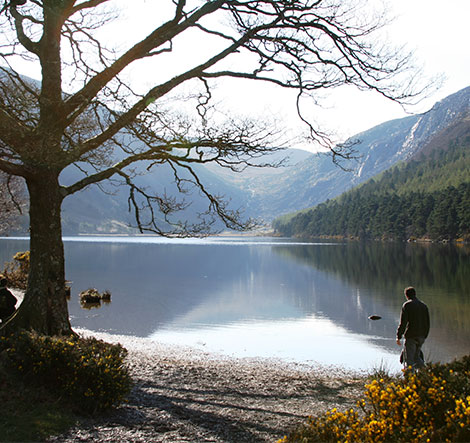St. Patrick’s prayer is a lorica, an ancient form of prayer for protection that may go back to the pre-Christian times of the Druids. Celtic peoples have always had a strong awareness of the need for protection from dark forces which threaten to overcome the person.
In part, this goes back to the precarious nature of existence at the time when travellers faced unknown dangers at every turn. As night fell and darkness closed in, the traveller was prey for wild beasts or enemies and could rely only on the light of fire and the power of prayer for protection. There may also be a mythic background to this awareness of the presence unknown and potentially malevolent powers. The Tuatha De Danann, pre-Christian Celtic gods or titans, were reputed to live under the ground. They had many uncanny and otherworldly powers and their proximity to human settlements meant the Celtic men and women of the time lived with the constant threat of being overcome by surprise.
In every culture and in every age, there is a sense of conflict between the forces of good and evil. In our own era, it is most potently expressed in literature and film such as Star Wars, Lord of the Rings and the Harry Potter saga. It is also played out in the media narratives of good and evil, friends and enemies that are used to explain and justify society’s actions.
An archetypal pattern seems to be at work here. It touches upon the fundamental insecurity of human existence and the fact that dark forces which are beyond one’s own power to control can assail the human person from without and within. As human beings, we are faced with the reality of illness and death, of war and injustice, of poverty and famine. Today we are beset by the terrifying and unpredictable power of climate change and know all our technological advances are but a drop of water in the ocean compared to nature’s prodigious power.
We also have to acknowledge and do battle with the dark forces within ourselves which have such power over our wills and, as St. Paul says, so often cause us not to do the good we want to do and instead to choose the evil we do not want (Rm 7:19). Each of us has a shadow side, a false self, an ego that feeds off illusion and pride and traps us within a web of false values and perceptions. This shadow emerges in depression, anxiety, addiction, despair, dysfunctional relationships of all kinds and many other ills which bedevil society today.

We are indeed in need of protection “against every cruel, merciless power” that opposes body and soul, as St. Patrick puts it.
In Celtic times, Christians were very aware of our mortality and insecurity. They knew very well their need of God and this imparted an urgency in their turning to him and calling on him. Celtic Christianity is known for its emphasis on the penitential aspects of the Church’s life and also for seeking out solitude where one can come to know and face the demons within. Both derive from a sense of human fragility and the deeply felt need to return to God.
Celtic Christians had many prayers and customs for calling on the protection of God. David Adam describes one of the most common forms of prayer – the caim. When one felt under attack, people would extend the index finger of their right hand and, turning slowly in a clockwise (sun-wise) direction, draw around themselves a full circle, all the while chanting or reciting a prayer for protection.
Circle me O God
Keep hope within
Despair without.
Circle me O God
Keep peace within
Keep turmoil out.
Circle me O God
Keep calm within
Keep storms without.
Circle me O God
Keep strength within
Keep weakness out.
(David Adam)
It is important to say this was not an attempt to manipulate God and get him to provide protection He would not otherwise be willing to grant; rather, it was a remembering through word and action of the constant presence of God who always gives us His protection and the making of a conscious choice to step within the circle of that protection. It was, as David Adam puts it a process of “tuning into” this encircling presence of God. In this way, Celtic Christians turned toward the Divine and, drawing from this source of sacred energy, faced the fears and dangers surrounding them and within them.
The caim is a reminder to us of our need to make a similar act of faith and turn towards God when we are threatened or facing difficulties within or without. In doing so, we open ourselves to His grace which, as St. Paul tells us, is always enough (2 Cor 12:9). “God never refuses grace to those who ask for it” (Catherine McAuley).
How often do we ask for grace? Do we, perhaps, forget or think that we don’t need it or don’t deserve it? Celtic spirituality reminds us to ask, and ask again, remembering the words of Jesus – “Ask and you shall receive” (Matt 21:22).